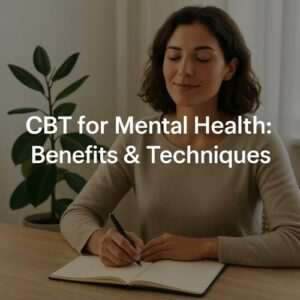
Exploring the Benefits of Mind-Body Yoga for Holistic Wellness
Mind-body yoga is more than just a fitness trend; it’s a holistic practice connecting the physical body with the mind and spirit. This
Herbal supplements have gained popularity for their potential to enhance energy and focus, offering a natural alternative to traditional stimulants. Many people are turning to these plant-based remedies to help combat fatigue and improve concentration. In this article, we’ll explore various herbal supplements that may help boost your energy and sharpen your focus, along with important safety considerations and lifestyle tips.
Okay, so what exactly are herbal supplements? Basically, they’re products made from plants that people use to try and improve their health. Think of it like this: instead of going straight for a pill from the pharmacy, some folks turn to nature’s pharmacy first. These supplements can come in all sorts of forms – pills, powders, teas, you name it. The main idea is to tap into the natural compounds found in plants for their potential benefits.
This is where it gets a little complicated. Herbal supplements work because of the active compounds they contain. These compounds can interact with your body in different ways, affecting things like your energy levels, focus, and even your mood. It’s not always a simple one-to-one relationship, though. Sometimes, it’s the combination of multiple compounds working together that creates the desired effect. It’s kind of like baking a cake – you need all the ingredients to get the right result. Some supplements like ashwagandha can help.
It’s important to remember that everyone’s body is different, so what works for one person might not work for another. Factors like your age, genetics, and overall health can all play a role in how you respond to herbal supplements.
So, why are people so interested in herbal supplements for energy and focus? Well, the promise is pretty appealing. Imagine being able to ditch that afternoon slump or power through a tough project without relying on caffeine. Some herbs are believed to have adaptogenic properties, which means they can help your body cope with stress and fatigue. Others might improve blood flow to the brain, boosting cognitive function. Here’s a quick rundown:
Ginseng is probably the most well-known herbal supplement for boosting energy. It’s been used for centuries in traditional Chinese medicine. There are different types of ginseng, like Asian ginseng (Panax ginseng) and American ginseng (Panax quinquefolius), and they have slightly different effects. Some studies suggest that ginseng can help reduce fatigue and improve mental performance.
Ginseng isn’t a magic bullet, but it can be a helpful addition to your routine if you’re feeling run down. Just be sure to talk to your doctor before starting it, especially if you have any existing health conditions or are taking medications.
Maca root is another interesting herb that’s gaining popularity as an energy booster. It grows high in the Andes Mountains of Peru and has been used traditionally for its potential to increase energy, stamina, and even libido. It’s considered an adaptogen, which means it may help your body adapt to stress.
Rhodiola Rosea is an herb that grows in cold, mountainous regions. It’s another adaptogen, and it’s often used to combat stress and fatigue. Some people find that it helps them feel more alert and focused, especially during stressful times. It might be worth a try if you’re feeling burned out and need a little extra support.
Let’s switch gears and talk about focus. It’s just as important as energy, right? Sometimes you’re not tired, you just can’t concentrate. Certain herbs have been used for ages to help with that, and it might be worth exploring them.
Ginkgo Biloba is probably the most well-known herb for memory. It’s been studied quite a bit, and some research suggests it can help with blood flow to the brain. I’ve heard people say it helps them feel sharper, especially when they’re studying or working on something that requires a lot of mental effort. It’s not a magic bullet, but it could be a useful tool.
Gotu Kola is another herb that’s been used traditionally for cognitive support. It’s supposed to help with things like memory and learning. I’ve read that it can also have a calming effect, which could be helpful if your lack of focus is due to stress or anxiety. It’s not as widely studied as Ginkgo Biloba, but there’s still some interesting research out there. I think it’s worth looking into if you’re interested in natural ways to support your brain.
Sage isn’t just for cooking! It’s also been used to improve mood and alertness. Some studies suggest it can help with memory and cognitive function. I’ve noticed that when I use sage in cooking, the aroma itself seems to have a bit of a pick-me-up effect. It might be worth trying sage tea or using sage essential oil to see if it helps you feel more alert and focused. It’s a gentle option, and it smells great, too.
It’s important to remember that everyone reacts differently to herbs. What works for one person might not work for another. It’s always a good idea to start with a small dose and see how you feel. And of course, talk to your doctor before trying any new herbal supplements, especially if you’re already taking medications.
It’s easy to get excited about the potential benefits of herbal supplements. But before you jump in, let’s talk about safety. It’s super important to approach these supplements with a healthy dose of caution and awareness. Your well-being is the top priority!
Seriously, chat with your doctor or a qualified healthcare provider before starting any new herbal supplement. They can help you figure out if a supplement is right for you, considering your health history, any medications you’re taking, and potential interactions. It’s like getting a personalized roadmap for your health journey. They might even have some insights you hadn’t thought of. Don’t skip this step!
Just like with any medication, herbal supplements can have side effects. These can vary from mild annoyances like digestive upset or headaches to more serious reactions. Pay attention to your body and how you feel after taking a new supplement. If you notice anything unusual or concerning, stop taking the supplement and contact your healthcare provider. Some supplements, like Asian ginseng, can affect blood pressure, so it’s good to be aware.
This is a big one! Herbal supplements can interact with prescription and over-the-counter medications. These interactions can sometimes reduce the effectiveness of your medications or increase the risk of side effects. For example:
It’s always better to be safe than sorry. Keep your healthcare provider informed about all the supplements you’re taking to avoid any potential problems.
It’s all about making informed choices and prioritizing your health. You got this!
Okay, so you’ve learned about some cool herbs that might help with energy and focus. Now what? Let’s talk about how to actually use them in your daily life. It’s not just about popping pills; it’s about making smart choices that work for you.
First off, not all supplements are created equal. Seriously. You’ve got to do a little digging. Look for brands that are transparent about their sourcing and manufacturing processes. Read reviews, check for certifications (like NSF or USP), and don’t be afraid to ask questions. It’s your health, after all! Think about what you’re hoping to achieve. Are you dragging in the afternoons? Maybe something like maca root would be a good fit. Need to focus during work? Ginkgo biloba might be worth a shot.
This is where things can get a little tricky. The dosage that works for your friend might not be the right amount for you. Always, always start with the lowest recommended dose on the product label. See how your body reacts. You can always increase it gradually, but you can’t undo taking too much. And remember, more isn’t always better. Some herbs can have side effects if you overdo it. Pay attention to your body and adjust accordingly. It’s also a good idea to check with a healthcare professional, especially if you’re on any medications. The FDA doesn’t standardize supplement dosages, so it’s important to be careful.
Listen, herbal supplements aren’t magic bullets. They’re tools that can support your health, but they work best when combined with a healthy lifestyle. Think about it: if you’re eating junk food, not sleeping, and stressed out all the time, no amount of herbs is going to make you feel amazing. Focus on the basics first: eat nutritious foods, get enough sleep, exercise regularly, and manage your stress. Then, add in herbal supplements as needed to give you an extra boost. It’s all about creating a holistic approach to well-being.
Think of herbal supplements as part of a bigger picture. They’re like the supporting actors in a movie – they can enhance the story, but they can’t carry it on their own. Your diet, sleep, and exercise are the main characters. Make sure they’re in good shape, and the supplements will have a much better chance of making a real difference.
Here’s a simple way to think about it:
When we’re thinking about using herbal supplements, it’s good to know what the science says. A lot of research is happening right now to figure out how well these herbs actually work. Some studies look at how herbs affect things like memory, focus, and energy levels. It’s not always clear-cut, but the more studies we have, the better we can understand what’s really going on. For example, there’s been some interesting work on sage supplementation and its impact on cognitive function in athletes.
Herbal supplements have been around for a long time! Before modern medicine, people relied on plants for healing. Traditional medicine systems, like Traditional Chinese Medicine and Ayurveda, have used herbs for centuries. This history can give us clues about which herbs might be helpful, even if we don’t fully understand why. It’s like learning from the past.
It’s important to remember that just because something has been used for a long time doesn’t automatically mean it’s safe or effective. But, this historical use can guide modern research and help us identify promising areas to explore.
What’s next for herbal supplements? Well, there’s a lot of exciting stuff happening. Scientists are using new technologies to study herbs in more detail than ever before. They’re looking at how herbs interact with our bodies at a molecular level. This could lead to a better understanding of how they work and how to use them safely and effectively. Plus, there’s growing interest in personalized medicine, where herbal treatments are tailored to individual needs. It’s a field with a lot of potential.
It’s easy to get caught up in quick fixes, but let’s be real: lasting energy and sharp focus come from how we live our lives every day. Think of herbal supplements as helpful additions, not replacements, for a solid foundation of healthy habits. Let’s explore some key lifestyle factors that can make a real difference.
What you eat seriously impacts your energy and focus. I’ve found that skipping meals or relying on sugary snacks leads to energy crashes and brain fog. A balanced diet, rich in whole foods, is the way to go.
I started paying attention to nutrient timing, and it’s been a game-changer. Eating a balanced breakfast within an hour of waking up sets the tone for the whole day. And avoiding heavy, processed foods at lunch prevents that afternoon slump.
I can’t stress this enough: sleep is non-negotiable. Skimping on sleep is like trying to drive a car with an empty gas tank. You might get somewhere, but you won’t get far, and you’ll probably feel terrible. Aim for 7-9 hours of quality sleep each night. It’s not just about the quantity, but also the quality. A consistent sleep schedule is also important.
Exercise isn’t just about physical health; it’s a powerful tool for boosting energy and focus. Gentle activities can make a big difference. When I’m feeling sluggish, a brisk walk or a quick workout can do wonders. It gets the blood flowing, releases endorphins, and clears my head.
In conclusion, while herbal supplements like ashwagandha and ginseng might help give you a little boost in energy and focus, they’re not magic solutions. It’s really important to remember that a healthy lifestyle is key. Eating well, getting enough sleep, and staying active are the best ways to keep your energy up and your mind sharp. If you’re feeling tired all the time, it’s a good idea to chat with a healthcare professional. They can help you figure out what’s going on and what might work best for you. So, if you want to explore herbal options, just be sure to do it safely and wisely.
Herbal supplements are natural products made from plants. They are often used to help with health issues or to improve energy and focus.
Herbal supplements work by using the natural chemicals found in plants. These chemicals can affect our bodies in different ways, helping to boost energy or improve concentration.
Yes, some herbal supplements like ginseng and maca root may help increase energy levels. They can be especially useful when combined with a healthy diet and exercise.
Before taking any herbal supplements, it’s important to talk to a doctor. Some herbs can interact with medications or cause side effects.
To safely use herbal supplements, start with small doses and choose high-quality products. It’s also a good idea to combine them with healthy habits like eating well and exercising.
Yes, some studies suggest that herbs like ginkgo biloba and gotu kola may help improve focus and memory, but more research is needed to confirm these effects.

Mind-body yoga is more than just a fitness trend; it’s a holistic practice connecting the physical body with the mind and spirit. This

In today’s fast-paced digital world, it’s easy to feel overwhelmed by the constant stream of information and notifications. This phenomenon, known as digital

In 2025, prioritizing mental wellness is crucial for navigating modern life’s challenges. Maintaining a healthy mind is essential, and this article offers practical strategies

In today’s tech-driven world, it’s easy to feel overwhelmed and drained. Constant notifications and screen time can leave us feeling mentally exhausted. That’s why

Exploring Mindful Movement Yoga: A Journey to Inner Peace and Wellness

Cognitive Behavioral Therapy (CBT) is a widely recognized therapeutic approach for addressing various mental health challenges.

HealthyRelaxation.com uses cookies and similar technologies to enhance your browsing experience, provide personalized content, and analyze our traffic.
By clicking “Accept”, you consent to the processing of your data, including unique identifiers and browsing activity, for these purposes. You may choose to customize your settings or withdraw consent at any time. Please note that certain site features may be affected if you decline.
Feel better. Live calmer. Unplug with purpose.